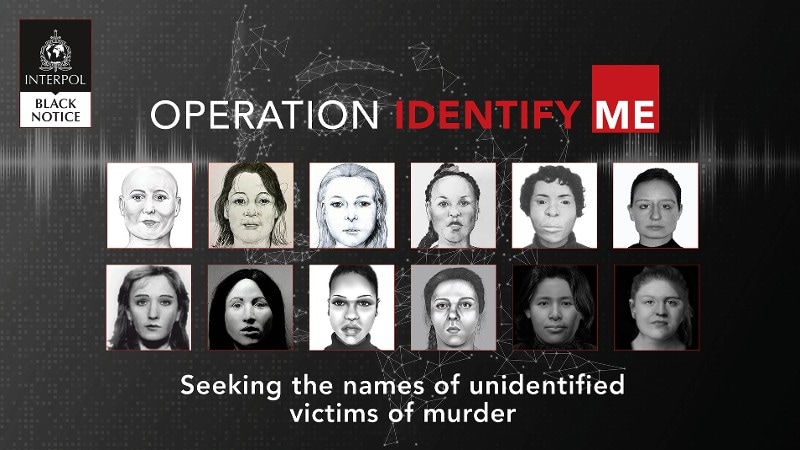Global appeal for information on 22 suspected female murder victims
Today, the Bundeskriminalamt in Germany, the Federal police in Belgium, the police in the Netherlands and INTERPOL have launched “Operation Identify Me” to identify 22 murdered girls and women. In almost all of the cases it’s certain that the victims were murdered. Who they are, where they are from and why they were left in Germany, Belgium and the Netherlands is unknown. Because of the campaign INTERPOL launches a new online Identify Me list of all these murder cases.

From today, an overview of all cases is available on www.interpol.int/im, showing facial reconstructions of the murdered women, videos and pictures of their jewelry and clothing. The pages also list characteristics such as estimated age, hair colour, eye colour and other physical characteristics. The website is public-friendly, so visitors will not be confronted with shocking pictures. Most of the cases are from the period between 1990 and 2010 and the most recent is a Belgian case from 2019.
The launch of the list is supported by famous women from the participating countries. In an online video actresses, singers and sports women appeal to the public to report the names of the murdered women. Among them are actresses Carice van Houten and Veerle Baetens, singers S10 and Axelle Red, boxing champion Regina Halmich and sports reporter Katrin Müller-Hohenstein.
The cases
A young girl showing clear signs of neglect, killed and left behind in the woods in Noord-Brabant, the Netherlands. A young woman found naked in the Albertkanaal in Belgium, killed by stabbing. And the partly charred body of a young woman found in the woods of Altena in Germany. ‘All twenty-two cases are so tragic and heart-wrenching’ comment Carina van Leeuwen and Martin de Wit of the Netherlands Police, who initiated the campaign. ‘Most victims died by highly violent crimes, and in some cases, we know that they were abused or starved before they died.’
Graves
Partly because the women are likely from countries other than where they were found, we have not yet been able to establish their identities. It is possible that their bodies were left in our countries to make criminal investigation more difficult. The victims were buried in nameless graves. Van Leeuwen and De Wit: ‘But there must be people in this world who miss the victims, most of whom were young women and girls. Relatives, friends or acquaintances. We hope to reach them through this campaign. Anyone can help us by supporting this campaign and talking about it, especially online.’
Names
To force a breakthrough in these cases, worldwide attention is needed. For some of the women, we have strong suspicions that they come from specific regions in Eastern Europe, but in other cases all options are open. Of course, we hope that identifying the victims will also point us towards the perpetrators of these crimes. However, the main focus of this campaign is to establish the victims’ identities. DNA is available from most of the victims so that their identity can be determined through comparison if necessary. ‘We want to stress that we are looking for names’, says Carolien Opdecam of the Belgian Federal Police. ‘The victim’s identity is often the key to unlocking the mysteries of a case.’ Anja Allendorf of the German police adds: ‘In similar investigations, such as the recent case from Nederweert in the Netherlands, establishing the victim’s identity ultimately led to the arrest of a suspect – in this case the victim’s former partner, who was then arrested in Germany.’
Video message
Dutch actress Carice van Houten is one of the women that is supporting the campaign in an online video. She was moved by the victims’ fate and wanted to help. Carice van Houten: ‘I think it’s so sad and lonely that these women, who had such a horrible fate, were buried without their own name. I want to make an appeal to everyone to take a look at the list to see if they recognize anybody on it.’
Information
Do you have information on the possible identity of one of the women? Please get in contact now and tell us about it in as much detail as possible. You can email us directly via coldcase@politie.nl. You can also reach us by phone in Dutch or in English. The number is +31 (0) 800 6070. It’s also possible to send us information anonymously via Meld Misdaad Anoniem +31 (0) 800 7000. There is also a contact form on the campaign website on www.interpol.int/im. An overview of all the Dutch cases can be found at here.
Interpol, Identify Me and Black Notices
For years Interpol is playing an essential part in the exchange of information about unidentified human remains. This information is exchanged between police organizations in so called Black Notices. In Operation Identify Me for the first time information from these Black Notices is shared with the public in order to identify the victims. Interpol is also responsible for I-Familie, a DNA-database, especially for relatives of missing persons. 'Black Notices allow law enforcement agencies to collaborate and share information across borders, ultimately helping to bring closure to the families of the deceased and bring offenders to justice,' said Susan Hitchin, Coordinator of INTERPOL’s DNA Unit.
